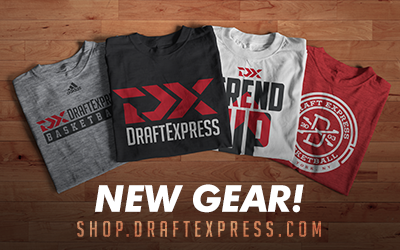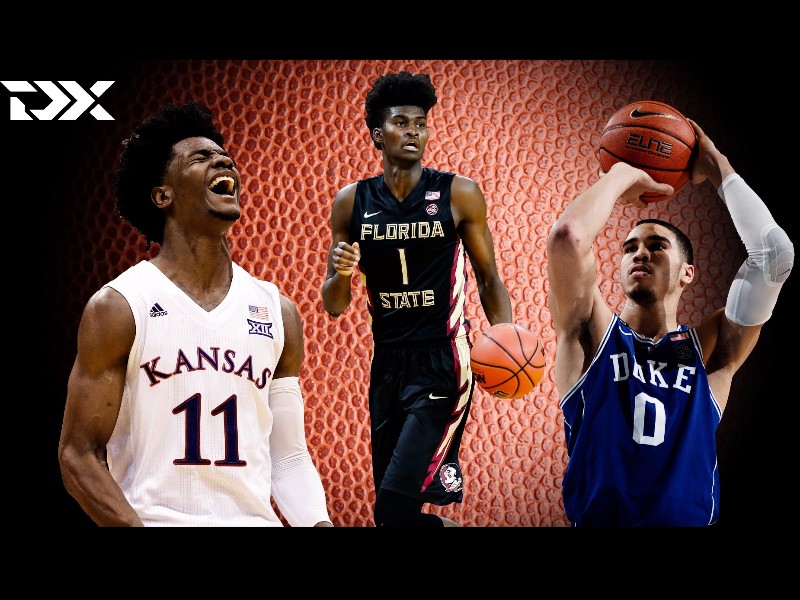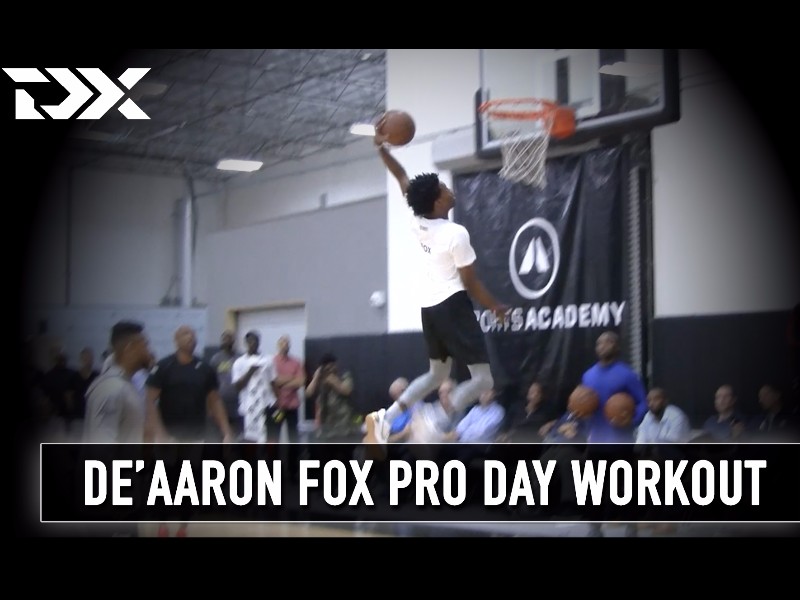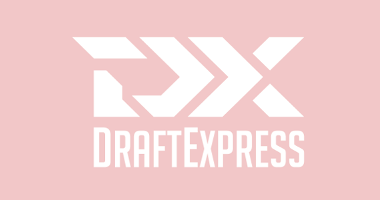Here is a photo of the first page of the memorandum, followed by its complete text.
TO: Men's Basketball Student-Athletes with Remaining Eligibility.
FROM: Rachel Newman Baker
Director of Agent, Gambling and Amateurism Activities
Steve Mallonee
Managing Director of Membership Services/Division I Governance Liaison
SUBJECT: Information Regarding the 2007 NBA Draft, Agents, and Tryouts.
We understand that you may have remaining intercollegiate eligibility, but may also have a desire to "test the waters" as it relates to your pursuit of a potential professional basketball career. You will attempt to gauge your readiness for competition at the next level through a variety of methods, including tryouts with professional teams and you will undoubtedly rely on a number of individuals to assist in the decision-making process.
At the end of this process, you may in fact reach the conclusion that it is not in the best interest to pursue a professional career at this time, but rather to continue athletics participation at the intercollegiate level while pursuing your academic degree.
Involvement in activities during this process can affect your intercollegiate eligibility. The following information is designed to help you protect your eligibility while you "test the waters."
Five Points to Remember:
You will lose your eligibility IF:
1. You agree orally or in writing to be represented by an agent or any individual acting on behalf of the agent [e.g., runner].
2. You accept any benefits from an agent, a prospective agent or any individual acting on behalf of the agent [e.g., runner].
3. If you do not pay for all expenses in conjunction with a professional team tryout as they are incurred.
4. If you tryout with a professional team during the academic year.
5. If you enter the draft AND are drafted by a professional team.
Key Dates:
Portsmouth Invitational Tournament (Portsmouth, Virginia): April 4-7, 2007
Early-Entry Candidate Application Deadline: April 29, 2007
NBA Pre-Draft Camp (Lake Buena Vista, Florida): May 29-June 4, 2007
NBA teams can attend and host workouts involving draft eligible players: June 5-28, 2007
Early-Entry Withdrawal Deadline: June 18, 2007
NBA Draft (New York, New York): June 28, 2007
Frequently Asked Questions:
1. Am I allowed to enter the NBA draft early?
YES! You may enter a professional basketball league's draft one time during your collegiate career without jeopardizing your eligibility, provided you are not drafted by any team and you declare your intention to resume intercollegiate participation within 30 days after the draft. This declaration must be in writing to your director of athletics.
2. Am I allowed to participate in the NBA pre-draft camp in June?
YES! If you are invited, you may attend the pre-draft camp and accept actual and necessary expenses from the NBA to participate in the NBA pre-draft camp.
3. Can I participate in private workouts/tryouts with NBA teams if school is still in session?
NO! You may not tryout with an NBA team during the academic year if you are enrolled full-time. You may tryout with an NBA team during the summer.
4. Can my college coach arrange and schedule a professional team workout/tryout on or off campus during the academic year?
NO! It would not be permissible for a student-athlete institutional coach to organize and be present during a professional tryout that occurs on or off campus.
5. Can NBA teams pay for my private workouts/tryouts?
NO! In order to be able to participate in the tryout, you must pay for all expenses to attend the tryout (as they are incurred) on your own. It is not permissible for the NBA team to initially pay for the expenses for you with the condition that you would repay the NBA team after the tryout.
6. Can any other individual (e.g., agent, runner, or "advisor") pay for my private workouts/tryouts with NBA teams?
NO! You and your family are responsible for paying all expenses associated with any NBA team tryouts as they are incurred.
7. How do I withdraw my name from the draft?
The NBA has requested that all underclassmen who submitted their early-entry declaration need to submit a written statement by 5 p.m. Eastern time, June 18, 2007, indicating the following:
"I, {Student-Athlete, of name of NCAA college/university}, officially notify the NBA of my request to withdraw my name from consideration in the 2007 NBA Draft." In addition to the above information, please include contact information and date of submission.
This written statement can be faxed to:
Mr. David Stern
Commissioner National Basketball Association
Attention: Erika Ruiz
645 5th Avenue
Facsimile: primary fax: XXX/XXX-XXXX or secondary fax: XXX/XXX-XXXX
New York, New York 10022
Contact Erika Ruiz at the NBA offices directly if you have further questions at XXX/XXX-XXXX .
8. What is an "agent" according to NCAA rules?
An individual would be considered an "agent" if the individual markets your basketball skills to any NBA team or other professional teams (e.g., contact NBA teams to discuss your skills, set up tryouts with NBA teams).
9. Am I allowed to have any type of agreement with an agent?
NO! You are not permitted to have a written or oral agreement with an agent, or anyone who is employed by or acting on behalf of an agent or sports agency (i.e., "runner").
10. What is an "oral agreement" with an agent?
An oral agreement occurs if you verbally agree to have an agent perform any services (e.g., providing any expenses related to tryouts, arranging disability insurance, etc.) on your behalf OR you have knowledge that an agent is performing such services.
11. Is an agent allowed to contact teams on my behalf to arrange private workouts or tryouts?
NO! You cannot have an agent arrange a private workout/tryout with an NBA team.
12. Can my family members or other individuals who are associated with me as a result of playing basketball (e.g., high school coach, summer basketball coach, etc.) have an agreement with an agent to perform services on my behalf?
NO! Family members and other individuals are not permitted to enter into any agreements with an agent on your behalf.
13. Am I allowed to have an agreement with an agent if it is for future representation?
NO! You are not permitted to agree to a future representation agreement with an agent.
14. Is an agent allowed to provide me any benefits?
NO! You, your family, or your friends are not permitted to receive any benefits from an agent. Examples of material benefits include money, transportation, dinner, clothes, cell phones, jewelry, etc. However, benefits may also include, but are not limited to, activities such as tryout arrangements with a professional team and coordinating tryout schedules.
15. Am I permitted to have an advisor during this process?
YES, provided the advisor does not market you to NBA teams. However, an advisor will be considered an agent if they contact teams on your behalf to arrange private workouts or tryouts.
16. Can an institution cancel my athletics scholarship if I have an agreement with an agent?
YES! An institution is permitted to rescind your athletics scholarship if you have an agreement with an agent.
Helpful Tips:
You should keep your head coach and compliance coordinator informed of all activities during this process.
Be careful who you associate with during this process. Do it all yourself or work through your head coach. You may receive the assistance of your family members, provided they are not working with any individual who is marketing your athletics ability (e.g., contacting NBA teams, setting up tryouts with NBA teams).
If you do not have knowledge of who arranged your tryout, you have a responsibility to find out who did.
The NBA has a committee of general managers who will provide a confidential projection evaluation of a potential draftee's likely draft position. The committee is overseen by Stu Jackson of the NBA. If you are interested in obtaining a draft projection from the committee, please contact Ned Cohen with the NBA at XXX/XXX-XXXX..
You should remain in school and complete your academic courses while you "test the waters."
If you have questions regarding this information, please contact the NCAA agent, gambling, and amateurism activities staff at 317/917-6866 or rnewman@ncaa.org.
SIGNATURE:
Please sign your name and date below, which confirms that you have reviewed and understand this form and the information contained therein. I understand that if I am found to be in violation of the provisions of any of the information mentioned above, I may be declared ineligible for further intercollegiate competition.
Student-Athlete Signature ______________________________
Date ______________________________
Printed Name ______________________________
Institution ____________________________
Head Coach ______________________________
Date ______________________________
Compliance Officer ______________________________ Date ______________________________
The National Collegiate Athletic Association
March 20, 2007 RNB/AC/SM:esb
Editorial:
Reading through this memorandum, there appears to be a few discrepancies and/or ambiguities regarding how exactly the process should be handled, and who is allowed to be involved in it. Most people we talked to think this is clearly a knee-jerk reaction to the Randolph Morris situation two summers ago. From what weve been told, this rule has been around for a while, but it never reached a point that players were asked to sign such a document to ensure that they know about the policies the NCAA appears intent on enforcing this year.
At the beginning of last season, Pops Mensah-Bonsu was suspended for 3 games for violating NCAA rules regarding the tryout process for the NBA draft last spring, according to the Washington Post. His coach Karl Hobbs was quoted in that article saying: "At this point I really don't have a comment, except to say when guys work out or put their name in for the NBA draft, there needs to be more clarity I'll leave it at that."
Hobbs asked for it, so its clarity NCAA coaches are getting.
The second point of the memorandum states:
Be careful who you associate with during this process. Do it all yourself or work through your head coach. You may receive the assistance of your family members, provided they are not working with any individual who is marketing your athletics ability (e.g., contacting NBA teams, setting up tryouts with NBA teams).
This appears to conflict with the 6th question in the frequently asked questions:
What is an "agent" according to NCAA rules?
An individual would be considered an "agent" if the individual markets your basketball skills to any NBA team or other professional teams (e.g., contact NBA teams to discuss your skills, set up tryouts with NBA teams).
On one hand, the NCAA states that a player is allowed to receive the assistance of their family members in the draft process. On the other, it is clearly states that any individual (including family members?) who contacts an NBA team to discuss a players skills or set up workouts will be considered an agent according to NCAA rules. If we came away confused by the language on this memo, as did two lawyers we showed this to, it stands to reason that basketball players and their parents might too.
-Question 9 in the frequently asked questions states that:
You cannot have an agent arrange a private workout/tryout with an NBA team.
Corresponding with whats said in question #13 (an advisor will be considered an agent if they contact teams on your behalf to arrange private workouts or tryouts,) this would lead us to believe that if a player cannot have anyone besides themselves and their NCAA coach call NBA teams to set up workouts and discuss their draft stock, or their skills.
The NCAA would likely state that the correct procedure needed to be taken to have a players draft stock evaluated would be through Stu Jackson and the Undergraduate Advisory Committee (outlined in the helpful tips section).
There are numerous problems with this, though, with the main one being that it is simply impossible to predict what the draft will look like in April.
Contrary to what a coach like Bruce Pearl might tell his star player Chris Lofton for example, where a players stock stands in early-mid April often has no bearing whatsoever on where he might end up being drafted. Since this early on in the process no one knows exactly which underclassmen will be in the draft and how many spots in the lottery, 1st or 2nd round they will take up, or how those players will play in workouts or the pre-draft camp, this is a huge crapshoot were talking about.
In our opinion, that evaluation can only tell a player so much at this point. Some people we talked to in researching this article even went as far as to call it worthless, because of all the many variables involved.
Jackson was in fact quoted by Keith Sargeant of Gannett New Jersey saying: we err on the side of caution," which is quite an ambiguous statement that further muddies the waters.
Chris Lofton based most of his decision on whether or not to test his stock as many juniors are doing on the fact that the Undergraduate Advisory Committee informed him that he is considered a mid 2nd round pick. Two examples from the past two years illustrate how difficult it is to read these types of things this early on.
Exactly two years ago, you would be hard pressed to find more than a handful of NBA people at most who thought that Pitt sophomore big man Chris Taft would somehow fall out of the 1st round. He did, though, as poor workouts and even poorer preparation for the draft saw him fall all the way to the middle of the 2nd round, losing millions of dollars in the process. Monday morning quarterbacks would lead you to believe that Chris Tafts hype was strictly a product of the mock drafts, but any NBA executive with a sense of reality would tell you that where he was projected in April was an accurate assessment of where his draft stock stood at the time. This just shows you quickly things change in this business. In fact, Taft was still very likely considered a top-20 pick by most NBA executives as late as the first week of June, as evidenced by the fact that he was invited to the very prestigious "physical only" portion of the pre-draft camp in Chicago that year.
Its not a stretch to say that if NBA teams thought that they have all the answers to the draft in April, then the draft would be held in April. NBA teams at this point still havent had time to digest what is going on within their own organization, as they are still trying to sort out the end of their season, and for some, battle in the NBA playoffs. Once they have a chance to watch tape on all the hundreds of different draft eligible or possibly draft eligible prospects, and gather the thoughts of their scouts and front office executives who have watched the players play over the season, they become infinitely more knowledgeable about where things stand as far as individual draft stocks go. These things happen on a large scale in May and June, though, not in April.
Three years ago on the other hand, we found the exact opposite situation from Chris Taft in a mid-major player from a small school in Western Carolina--Kevin Martin. Very few top NBA executives came to the mountains of West Carolina to see him play his junior year, despite the fact that he was leading the country in scoring for most of the season. There was no absolutely no buzz about him whatsoever in NBA circles at this point in the year. He was not being talked about as a sleeper by anyone behind the scenes, and he was considered to be a late 2nd rounder at best or likely undrafted by the NBAs own underclassmen advisory committee headed by Stu Jackson.
This is not a knock on Stu Jackson or the other people on his committee, who do a very good job with what they do. The problem is that once you get past the top 15 prospects in the draft on any given year, you may as well be filling out an NCAA bracket in early March in terms of picking who ends up landing in the first round, who goes in the second round, and who goes undrafted. There are just too many variables that are completely out of the control of any one person to predict, no matter how well connected or powerful they are.
Had Kevin Martins head coach at Western Carolina been in charge of handling the draft process for him as the NCAA is now forcing players to do, Martin not only would not have been drafted in the first round, he would not have been a 2nd round pick either, since his coach told him that he should not put his name in the draft and was opposed to the idea all along. We later found out why, as he was fired just a year later in the wake of going 8-22 the next season after losing Martin to the first round of the NBA draft.
Martin now looks like the biggest steal of the 2004 draft after averaging over 20 points a game and shooting 47% from the field and 38% from the 3-point line. Thats not bad for a late 1st rounder who was projected to go in the late 2nd round or undrafted in April.
Completely ignoring the very touchy subject of whether college coaches have a clear conflict of interest in being the ones in charge of digging their own graves by aiding their best players leave their program for the NBA draft, there is also the question of whether they are even qualified to do so.
The NBA draft process is such a labyrinth of obstacles that need to be overcome for underclassmen to properly gauge their stock, know where and when to go work out for teams, and prepare themselves properly for it, that it takes up any normal agents entire day for two solid months to sort out fact from fiction, not to mention years of experience to understand how to decipher.
College coaches could very well be experts at running college teams and winning college games, but they certainly cant be considered experts in the NBA draft process. They arent qualified in terms of getting players ready for the draft, understanding NBA team needs, knowing the nuances of the draft process, and specifically helping their player get picked as high as his potential says he should. Thats definitely not a knock on them, its simply not their full-time job, nor should it be.
Its a clear mistake to assume that college teams are good at getting players prepared for the NBA, NBA workouts, or what they need to do to be ready both physically and mentally for the draft process. Once the NCAA season is over, there is a very limited amount of time College coaches can spend on the court with their players to help them prepare. Often times the people who end up working with the players to get them ready for the draft are 21 year old Team Managers, who with all due respect, are not qualified for this task either.
This is exactly how people like Tim Grover at Hoops the Gym in Chicago and David Thorpe at IMG Academy in Bradenton have a job. By going to prepare professionally with people who make a living getting players ready for the NBA draft workout process, they are putting themselves at a huge advantage over those who dont. One draft expert we spoke to likened this to one player being allowed to swim in the water as opposed to the other taking matters into his own hands and hiring a speedboat.
What a player does during his NCAA career is very important to help decide the range in which he might be drafted, but how he plays in workouts is really what decides how high they can end up going. Its not just a matter of preparing physically and mentally for all the specific drills that NBA teams will be putting them through in workouts, it also has a lot to do with just even being able to attend, and knowing which ones are worth their time and who they should be going up against.
That is more of a factor than ever this year following the rules changes the NBA put into effect stating no private workouts being allowed before the pre-draft camp, which we explained in depth all the way back in March both here and here. When May 3rd rolls around and NBA teams will finally be allowed to schedule private workouts for the month of June, do you think NCAA coaches will be fighting tooth and nail to get their juniors a spot in the very limited amount of dates that are available to be evaluated in? Or will the majority be snatched up by players represented by agents already?
Players like Kevin Martin at Western Carolina needed to be marketed and steered to the pros (a clear no-no according to the memo above) to have any chance of even being on the radar to get put in a situation to be drafted. Had Martin not had the person who is now his personal trainer email us in late April to urge us to come watch him work out, he probably would have been deprived of a good amount of the publicity that had a clear part in kicking his draft stock into gear. Martin ended up eventually conducting a well attended public workout in Chicago rather than attending the NBA pre-draft camp, where he looked very good, and ended up helping himself even more. This is just another thing that Martin would not have been able to do according to the guidelines outlined above. The person who ended up being his agent was the one who organized this workout and the private ones he landed as a result, something that his college coach most likely could not have done even if he did have the motivation to do so.
This is just one small example of the type of snowball effect or Rubik's cube many people speak about, where all the stars have to align perfectly on one day to help a player get drafted where his potential says he should go. Its an incredibly complicated process, where even the slightest mistake in timing can end up costing a player millions or even his own NBA career.
Many questions came out of the memo that was released by the NCAA on March 20th. Questions of what exactly the NCAA is trying to accomplish with this move, whether this was a knee-jerk response to the Randolph Morris situation, whether the NCAA is even interested in having their star players (who they make billions of dollars off by the way) test the NBA draft process, and many more.
Further questions include: will NCAA coaches (who also often make millions) get behind their star player and help him get the right info that might end up costing the coach his job? What happens if that coach doesnt have the proper contacts in the league or enough time to help him out? What if he just flat out says no, he wont help? How many NCAA violations have already been committed since the season ended or during the season itself? How will the NCAA police this matter? Will they follow a paper trail trying to find out who organized which workout with which NBA teams to see if infractions were committed? Will NBA teams cooperate? Did anyone ask them what they think about this? Are family members allowed to reach out to NBA teams to set up workouts, or are they considered agents too? Would any of this incredibly ambiguous memo hold up in court? What do you do with the many players and their families who have built up relationships with agents since they were teenagers?
There is no question that every party involved in this very complex issue has some serious conflicts that could be difficult to overcome. On one hand we find the NCAA, who relies so heavily on these star players to keep the sport viable from a marketing perspective. On another we find the coaches, who rely equally as much on their stars to help them win games, keep their job and make a living. The players families are equally conflicted, as most of them have neither the means nor the know how to steer their young prodigies through such a complicated and dangerous process. Emotional attachment could prevent them from being 100% objective in sifting through the information they receive, while the potential financial implications involved could cloud the situation significantly and make the decision making process much more difficult.
The NBA teams will have to do some internal soul searching as well, as they arent always innocent bystanders themselves. Its in their best interest to have as deep a pool of players to choose from as they can, and even if their motives are sound, they sometimes have a tendency to tell players and families what they want to hear since they dont have the heart to tell them know to their face that they dont think they are good enough to play for them.
Its preposterous to think that a player like Jason Smith of Colorado State for example will have to conduct his entire NBA draft process through a coach who he does not even know, after his old coach was fired and recently replaced.
Then again, maybe it's not so surprising that a player like Chris Lofton decided not to test the waters this year. If he indeed is committed to returning to Tennessee next year (as he should), then he'd probably be wasting his time.
Soon well be finding out what kind of impact these policies will have on the NBA draft process. Many think that it will have the opposite effect of what was intended, as players who clearly arent 1st rounders might feel that they have no choice but to hire an agent if they want to have a chance at being drafted high in what is perceived to be by many as a very strong draft. Players who are merely testing the waters will likely be at a significant disadvantage compared with those who arent, as they wont be able to get the same training, attend the same amount of workouts, receive the same information about team needs and be able to negotiate who they work out with and when.
Itll be interesting to see which fingers will be pointed where if the worst-case scenario that many envision actually ends up happening and poorly advised underclassmen start falling into the 2nd round or even go undrafted. Up until now the media had an obvious scapegoat to blame, as some of the bad apples amongst the large group of agents and runners has given the entire industry a worse reputation than it probably deserves.
With the NBA age limit on one side, and the NCAA policies on testing the waters on the other, the already complicated road to the NBA becomes more difficult to navigate. The NCAA might want to look into having a professional and unbiased 3rd-party handle this process in the future.































Comments